Eleanor “Ellie” McCracken
The Town Musicians of Bremen
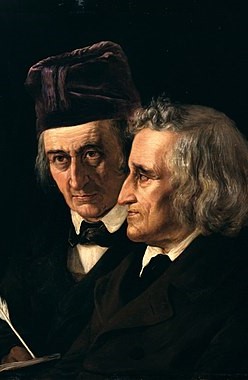 The brothers Jacob and Wilhelm Grimm are known around the world. The Brüder Grimm website advises that the first collection of 86 stories, the Children’s and Household Tales was released on December 20, 1812, and has been translated into 160 languages and dialects. It seems there are no available records of recent sales but there is a copy of the first English language edition illustrated by Arthur Rackham for sale in a New York bookstore with an asking price of $4,750.
The brothers Jacob and Wilhelm Grimm are known around the world. The Brüder Grimm website advises that the first collection of 86 stories, the Children’s and Household Tales was released on December 20, 1812, and has been translated into 160 languages and dialects. It seems there are no available records of recent sales but there is a copy of the first English language edition illustrated by Arthur Rackham for sale in a New York bookstore with an asking price of $4,750.
The brothers attained their education at the university at Marburg, Germany. As students of folklore their curiosity grew into a lifelong devotion to bring folklore to the masses. As academics, philologists, cultural researchers, and authors they have succeeded far beyond their imagination.
The Town Musicians of Bremen was number 27 in the 1819 version of Grimm’s Tales. It tells of four aging animals, a donkey who meets a dog, a donkey and a dog who meet a cat, and the three of them meet a rooster. They have each been neglected and mistreated by their masters. On that day they decide to run away and become town musicians in the city of Bremen. Bremen was known for its freedom and each longed to be without an owner.
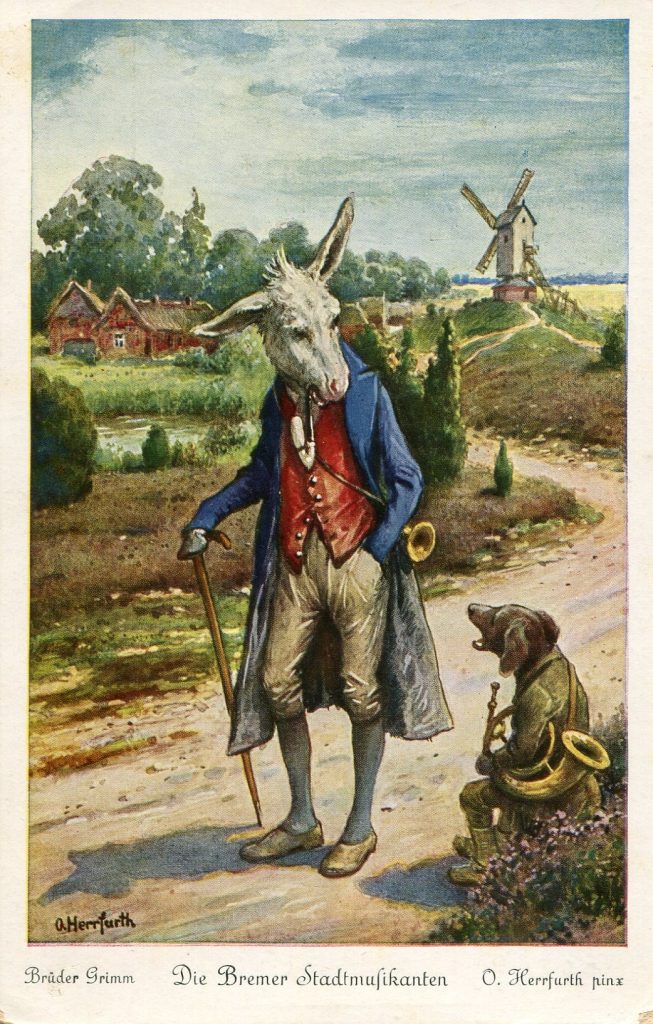
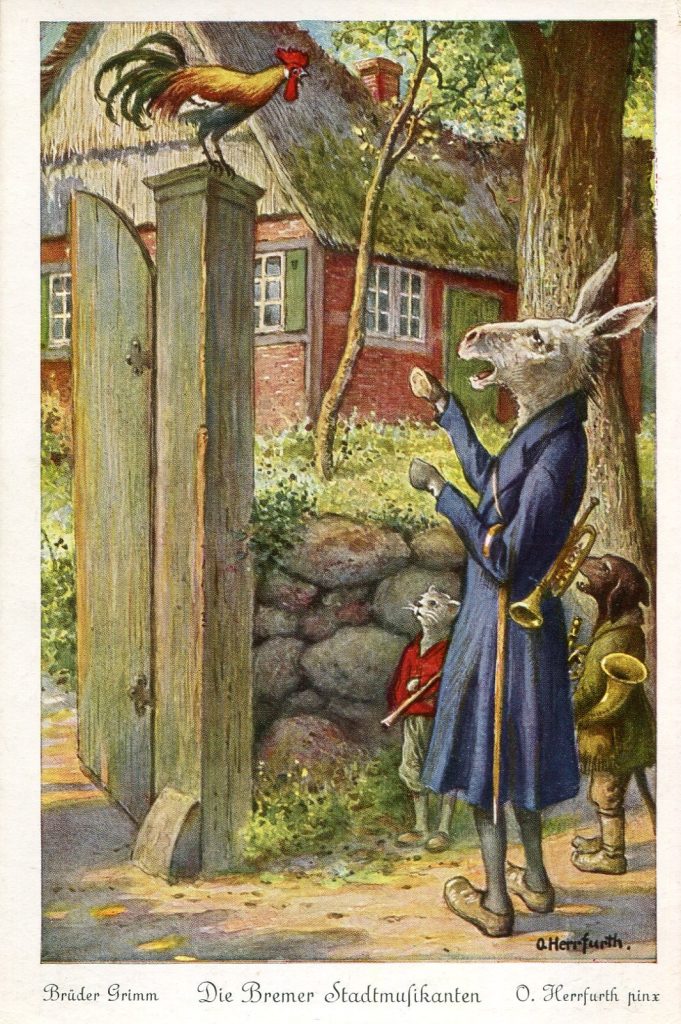
They never reach Bremen for along the way they see a lighted cottage; they look inside and see three robbers enjoying their ill-gotten gains. Standing on each other’s backs, they decide to scare the robbers away by making a din; the men run for their lives, not knowing what the strange sound is. The animals take possession of the house, eat a good meal, and settle in for the evening.
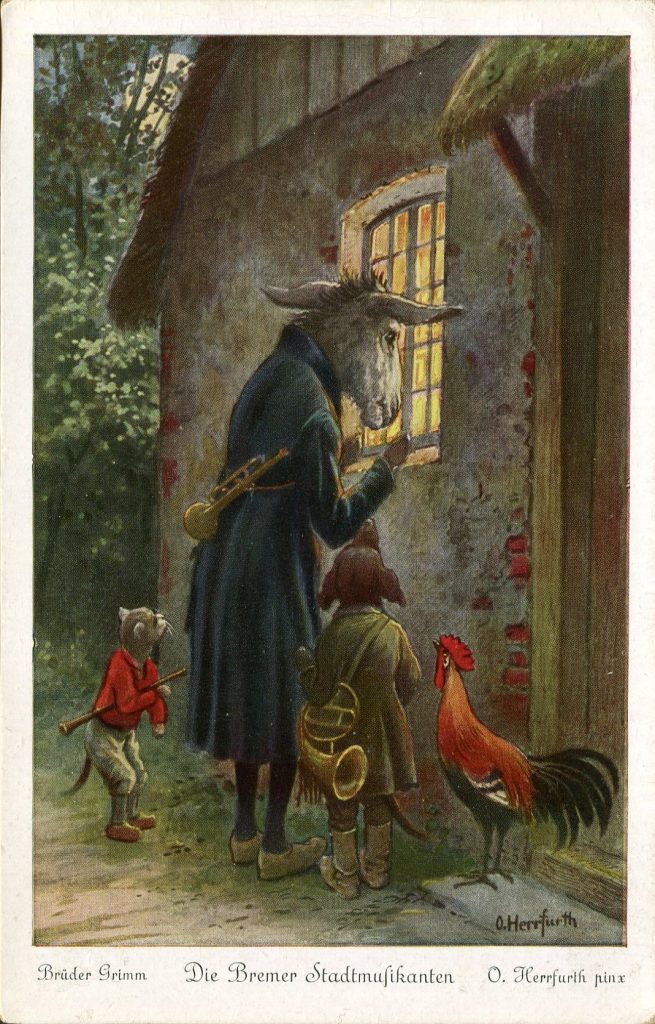
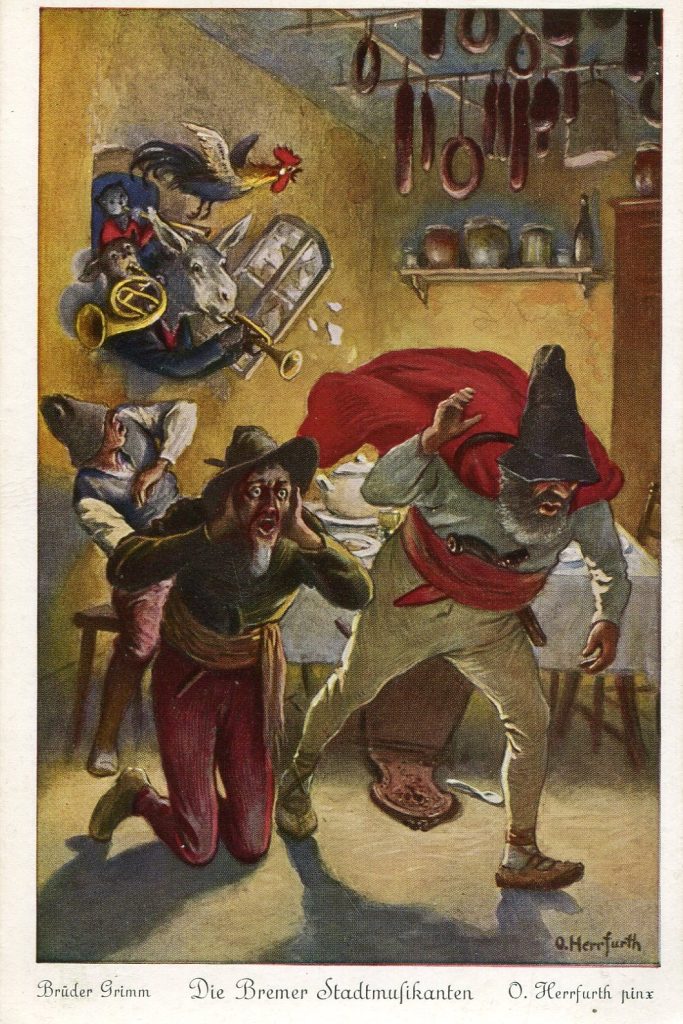
Later that night, the robbers return and send one of their members in to investigate. He sees the cat’s eyes shining in the darkness and thinks he is seeing the coals of the fire. The robber reaches over to light his candle. Things happen in quick succession; the cat scratches his face with her claws, the dog bites him on the leg, the donkey kicks him with his hooves, and the rooster crows and chases him out the door.
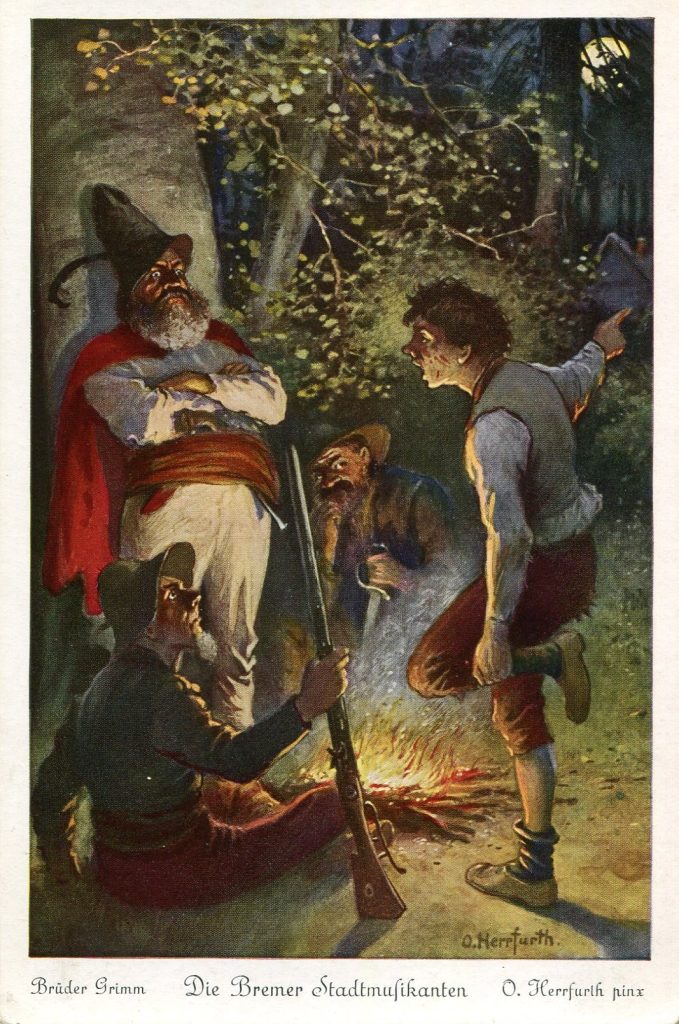

The terrified robber tells his companions that he was beset by a horrible witch who had scratched him with her long fingernails (the cat), a dwarf who has a knife (the dog), a black monster who had hit him with a club (the donkey), and worst of all, a bat who had screamed from the rooftop (the rooster). The robbers abandon the cottage to the strange creatures who have taken it, where the animals live happily for the rest of their days.
* * *
Some of Europe’s most collectible signed artist postcards are those of Oskar Herrfurth. Born in 1862, Herrfurth enjoyed a privileged childhood in the medieval village of Merseburg (about 18 miles west of Leipzig). At a time when students received an education determined by family and religion and based on demonstrated talents, he was enrolled in the art school in Weimar. After completion of his studies, he remained in Weimar and found work as a book illustrator and servant to the art community. His skills in creation of concept to image was highly lauded in the German press. His genre paintings, illustrations, and fairy tale pictures provided an abundant income for more than two decades.
His move to Hamburg around the turn of the twentieth century provided additional opportunities. He was sought after to illustrate works by the Grimm brothers and the publishers of works by Hans Christian Anderson and Ludwig Bechstein. Bechstein is remembered as the source of myths and legends set to music by the Hungarian Franz Liszt.
One option presented to Herrfurth was the publication of his art in postcards by the Uvachrome Company. In total he became the artist of record for twelve, six-part sets. These cards of the Bremen Musicians are six of the seventy-two.
* * *
The original first English translation of the German text.
There was once an ass whose master had made him carry sacks to the mill for many a long year, but whose strength began at last to fail, so that each day as it came found him less capable of work. Then his master began to think of turning him out, but the ass, guessing that something was in the wind that boded him no good, ran away, taking the road to Bremen; for there he thought he might get an engagement as town musician.
When he had gone a little way he found a hound lying by the side of the road panting, as if he had run a long way. “Now, Holdfast, what are you so out of breath about?” said the ass. “Oh dear!” said the dog, “now I am old, I get weaker every day, and can do no good in the hunt, so, as my master was going to have me killed, I have made my escape; but now, how am I to gain a living?” – “I will tell you what,” said the ass, “I am going to Bremen to become town musician. You may as well go with me and take up music too. I can play the lute, and you can beat the drum.” And the dog consented, and they walked on together.
It was not long before they came to a cat sitting in the road, looking as dismal as three wet days. “Now then, what is the matter with you, old shaver?” said the ass. “I should like to know who would be cheerful when his neck is in danger,” answered the cat. “Now that I am old my teeth are getting blunt, and I would rather sit by the oven and purr than run about after mice, and my mistress wanted to drown me; so, I took myself off; but good advice is scarce, and I do not know what is to become of me.” – “Go with us to Bremen,” said the ass, “and become town musician. You understand serenading.” The cat thought well of the idea and went with them accordingly.
After that the three travelers passed by a yard, and a cock was perched on the gate crowing with all his might. “Your cries are enough to pierce bone and marrow,” said the ass; “what is the matter?” – “I have foretold good weather for Lady-day, so that all the shirts may be washed and dried; and now on Sunday morning company is coming, and the mistress has told the cook that I must be made into soup, and this evening my neck is to be wrung, so that I am crowing with all my might while I can.” – “You had much better go with us, Chanticleer,” said the ass. “We are going to Bremen. At any rate that will be better than dying. You have a powerful voice, and when we are all performing together it will have a very good effect.” So, the cock consented, and they went on all four together.
But Bremen was too far off to be reached in one day, and towards evening they came to a wood, where they determined to pass the night. The ass and the dog lay down under a large tree; the cat got up among the branches, and the cock flew up to the top, as that was the safest place for him. Before he went to sleep he looked all round him to the four points of the compass, and perceived in the distance a little light shining, and he called out to his companions that there must be a house not far off, as he could see a light, so the ass said, “We had better get up and go there, for these are uncomfortable quarters.”
The dog began to fancy a few bones, not quite bare, would do him good. And they all set off in the direction of the light, and it grew larger and brighter, until at last it led them to a robber’s house, all lighted up. The ass, being the biggest, went up to the window, and looked in. “Well, what do you see?” asked the dog. “What do I see?” answered the ass; “here is a table set out with splendid eatables and drinkables, and robbers sitting at it and making themselves very comfortable.” – “That would just suit us,” said the cock. “Yes, indeed, I wish we were there,” said the ass. Then they consulted together how it should be managed so as to get the robbers out of the house, and at last they hit on a plan. The ass was to place his forefeet on the windowsill, the dog was to get on the ass’s back, the cat on the top of the dog, and lastly the cock was to fly up and perch on the cat’s head. When that was done, at a given signal they all began to perform their music. The ass brayed, the dog barked, the cat mewed, and the cock crowed; then they burst through into the room, breaking all the panes of glass.
The robbers fled at the dreadful sound; they thought it was some goblin and fled to the wood in the utmost terror. Then the four companions sat down to table, made free with the remains of the meal and feasted as if they had been hungry for a month.
And when they had finished, they put out the lights, and each sought out a sleeping-place to suit his nature and habits. The ass laid himself down outside on the dunghill, the dog behind the door, the cat on the hearth by the warm ashes, and the cock settled himself in the cockloft, and as they were all tired with their long journey, they soon fell fast asleep.
When midnight drew near, and the robbers from afar saw that no light was burning, and that everything appeared quiet, their captain said to them that he thought that they had run away without reason, telling one of them to go and reconnoiter. So, one of them went, and found everything quite quiet; he went into the kitchen to strike a light and taking the glowing fiery eyes of the cat for burning coals, he held a match to them in order to kindle it. But the cat, not seeing the joke, flew into his face, spitting and scratching.
Then he cried out in terror, and ran to get out at the back door, but the dog, who was lying there, ran at him and bit his leg; and as he was rushing through the yard by the dunghill the ass struck out and gave him a great kick with his hind foot; and the cock, who had been wakened with the noise, and felt quite brisk, cried out, “Cock-a-doodle-doo!”
Then the robber got back as well as he could to his captain, and said, “Oh dear! in that house there is a gruesome witch, and I felt her breath and her long nails in my face; and by the door there stands a man who stabbed me in the leg with a knife; and in the yard there lies a black specter, who beat me with his wooden club; and above, upon the roof, there sits the justice, who cried, ‘Bring that rogue here!’ And so I ran away from the place as fast as I could.”
From that time forward the robbers never ventured to that house, and the four Bremen town musicians found themselves so well off where they were, that there they stayed.
And the person who last related this tale is still living, as you see.
Love The Musicians of Bremen it is one of my favorite Brother Grimm stories. These cards are wonderful. I have a few modern postcards of the statue in Bremen of the Musicians but nothing like these.
I remember that when I was a child, I had a book relating the story of “The Bremen Town Musicians”.
What a wonderful story. Along with The pictures make me want to look for some of these cards. Will look for some of those at the K. C. Show today. Thank you for reminding me of these great stories.
The story is told beautifully and the cards are wonderful. I read this when I was a kid and it was great to be reminded of it. Thank you for retelling it and displaying the lovely cards.
Wonderful stories and cards, Ellie. I very much wish I could meet you !